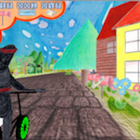Personal Analytics and Digital Health
We investigate novel approaches for highly adpative persuasive technology related to health and well-being. Persuasion can, for instance, be realized in a playful way—as a serious game—or as a monitoring app. In our work we focus on activity recognition, user-modelling and methods to generate user- and context-adaptive recommendations. Our work in this area is interdisciplinary integrating the disciplines computer engineering, cognition science, ethics, electrical engineering, and health science.

Personal Analytics
Personal Analytics for health reasons, also known as Self-Monitoring, Health-Monitoring, Self-Tracking, or Quantified Self, is a new research topic with increasing relevance pushed by a wide-spread of smartphones and sensor-technologies for private use. The research topic implies the fields of pervasive computing, ubiquitous sensor networks, data analysis, and persuasive technology.

Health and Serious Games
A serious game is a specific type of game whose primary purpose goes beyond pure entertainment by teaching knowledge or training skills. Our group develops and evaluates serious game concepts and prototypes within different application areas with a focus on health care, physical and mental fitness. The track record of our group includes games like a health game prototype, which shall improve the self-management process of teenage patients with insulin-dependent diabetes as well as a serious game with tangible interfaces for cognitive training.







